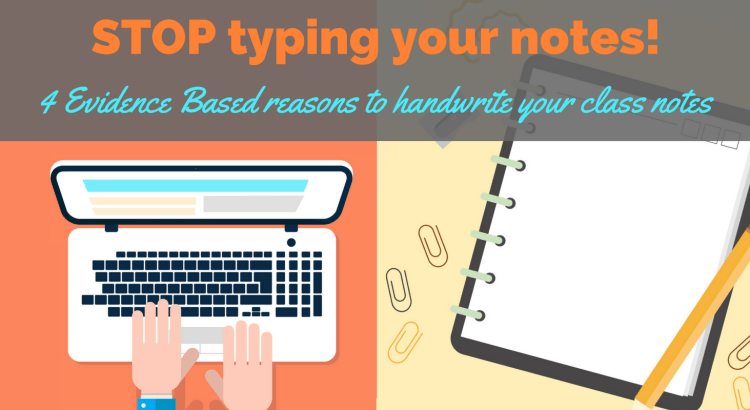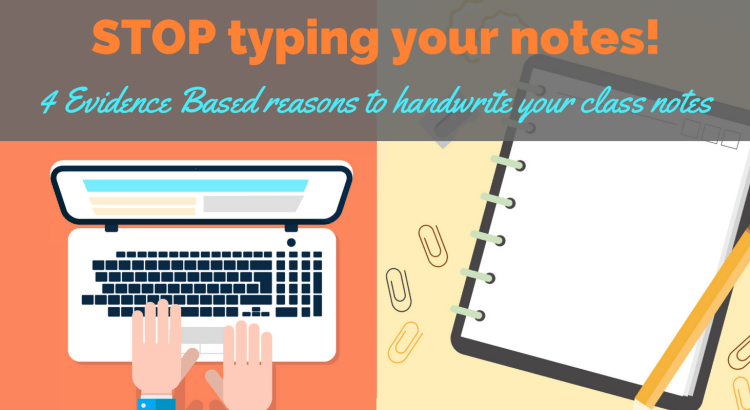With laptops, tablets, phones, and phablets becoming more portable and more common more students are using them to take notes. As it turns out though, research seems to indicate there is more benefit to taking notes by hand then we realize.
1. Distractions and Multitasking

The first reason to take notes with pen and paper is fairly obvious and surely something you’ve experienced: Technology is distracting.
When you’re taking notes on your computer, you might also open your messenger, check Facebook, respond to emails, or click into any other dozens of things. All of that multitasking is going to negatively affect your learning.
Don’t believe it?
Check out this article: Laptop multitasking hinders classroom learning for both users and nearby peers published in Computers & Education.
You’re probably thinking: but I only look away for a second or two… Well those seconds add up over the course of a lecture. And imagine over the course of a semester?
I did some quick math: It took me about 12 seconds to open iMessage, type a short message, send it, and switch back to MS word for notes. If I send just 10 messages like that in class every class, I’ve lost over an hour of class time in the semester! And let’s face it, 10 messages is pretty short. Imagine if you also read 10 messages. Now that’s 2 hours of class time! Think of all the little bits of information you’re going to miss during a semester!
2. Verbatim vs Selective Processing
“When people type their notes, they have this tendency to try to take verbatim notes and write down as much of the lecture as they can,” says Dr. Pam Muelle, PhD.
You might say, “so what? Isn’t it a good thing to have everything the professor says written down?”
It might seem like a good idea until you consider your other option: selective processing. Mueller learned this from a research study she did on the topic which was published in a peer-reviewed journal. She found that “The students who were taking longhand notes in our studies were forced to be more selective — because you can’t write as fast as you can type. And that extra processing of the material that they were doing benefited them.”
How are you processing? You’re summarizing, paraphrasing, mapping concepts, linking ideas. This is way different than copying down words without thinking about them actively.
3. Better Learning: Facts and Concepts!
In Mueller’s experiment, she showed TED Talks to students who were given either a computer or notebook to take notes. After, they were asked questions about the videos. They were asked two types of questions: factual questions and conceptual questions.
You might think that verbatim-notetakers did better on factual questions. But they didn’t! They performed the same as handwritten note takers. Even though the laptop users wrote almost double the number of words, they did not perform any better on factual questions.
What about conceptual questions you ask? The laptop users did “significantly worse” in answering those questions. And if we’re being honest, conceptual learning is probably more what you’re going to be doing in graduate school anyway.
Just to be fair, the experimenters decided to try it again. This time they told laptop users to avoid taking verbatim notes. They tried! But they couldn’t do it. The more words they wrote the worse they tended to perform!
4. Studying is More Useful with Handwritten Notes
So, you might be thinking “Well, if they got to review their notes before the exam, the laptop users would do better! They have more to study!” Wrong. Both groups were allowed to review their notes before the exam, and the laptop users still did worse than those who hand wrote notes.
Personally, I think the people who hand wrote their notes probably did better because they simply recalled the information more easily. Even without studying, handwriting involves an encoding process that is better at stimulating your memory.
What are you going to do?
So, are you going to type your notes? If you do, remember that you might be missing out on a lot of class time, distracting your peers, and inhibiting your learning!
Transitioning to paper notes can be a little scary. Your grades and your learning are important to you. But remember that there is evidence to support a handwritten approach. Also, make it a slow transition. Try it just in one class first to get used to it.

